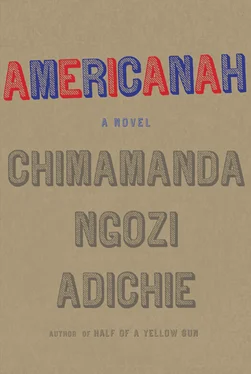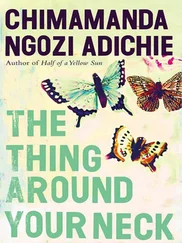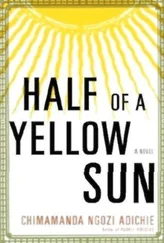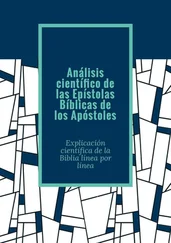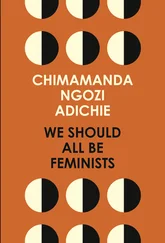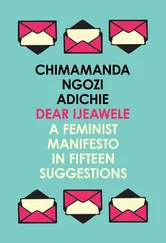“I can’t remember the last time I watched that stupid station,” Ranyinudo said. “They lie for the government but they can’t even lie well.”
“So which Nigerian channel do you watch?”
“I don’t even really watch any o. I watch Style and E! Sometimes CNN and BBC.” Ranyinudo had changed into shorts and a T-shirt. “I have a girl who comes and cooks and cleans for me, but I made this stew myself because you were coming, so you must eat it o. What will you drink? I have malt and orange juice.”
“Malt! I’m going to drink all the malt in Nigeria. I used to buy it from a Hispanic supermarket in Baltimore, but it was not the same thing.”
“I ate really nice ofada rice at the wedding, I’m not hungry,” Ranyinudo said. But, after she served Ifemelu’s food on a dinner plate, she ate some rice and chicken stew from a plastic bowl, perched on the arm of the couch, while they gossiped about old friends: Priye was an event planner and had recently gone big time after being introduced to the governor’s wife. Tochi had lost her job at a bank after the last bank crisis, but she had married a wealthy lawyer and had a baby.
“Tochi used to tell me how much people had in their accounts,” Ranyinudo said. “Remember that guy Mekkus Parara who was dying for Ginika? Remember how he always had smelly yellow patches under his arms? He has major money now, but it is dirty money. You know, all these guys who do fraud in London and America, then run back to Nigeria with the money and build mighty houses in Victoria Garden City. Tochi told me that he never came to the bank himself. He used to send his boys with Ghana Must Go bags to carry ten million today, twenty million tomorrow. Me, I never wanted to work in a bank. The problem with working in a bank is that if you don’t get a good branch with high-net customers, you are finished. You will spend all your time attending to useless traders. Tochi was lucky with her job and she worked in a good branch and she met her husband there. Do you want another malt?”
Ranyinudo got up. There was a luxurious, womanly slowness to her gait, a lift, a roll, a toggle of her buttocks with each step. A Nigerian walk. A walk, too, that hinted at excess, as though it spoke of something in need of toning down. Ifemelu took the cold bottle of malt from Ranyinudo and wondered if this would have been her life if she had not left, if she would be like Ranyinudo, working for an advertising company, living in a one-bedroom flat whose rent her salary could not pay, attending a Pentecostal church where she was an usher, and dating a married chief executive who bought her business-class tickets to London. Ranyinudo showed Ifemelu his photographs on her phone. In one, he was bare-chested with the slight swell of a middle-aged belly, reclining on Ranyinudo’s bed, smiling the bashful smile of a man just sated from sex. In another, he was looking down in a close-up shot, his face a blurred and mysterious silhouette. There was something attractive, even distinguished, about his gray-speckled hair.
“Is it me or does he look like a tortoise?” Ifemelu said.
“It’s you. But Ifem, seriously, Don is a good man o. Not like many of these useless Lagos men running around town.”
“Ranyi, you told me it was just a passing thing. But two years is not a passing thing. I worry about you.”
“I have feelings for him, I won’t deny it, but I want to marry and he knows that. I used to think maybe I should have a child for him but look at Uche Okafor, remember her from Nsukka? She had a child for the managing director of Hale Bank and the man told her to go to hell, that he is not the father, and now she is left with raising a child alone. Na wa .”
Ranyinudo was looking at the photograph on her phone with a faint, fond smile. Earlier, on the drive back from the airport, she had said, as she slowed down to sink into, and then climb out of, a large pothole, “I really want Don to change this car. He has been promising for the past three months. I need a jeep. Do you see how terrible the roads are?” And Ifemelu felt something between fascination and longing for Ranyinudo’s life. A life in which she waved a hand and things fell from the sky, things that she quite simply expected should fall from the sky.
At midnight, Ranyinudo turned off her generator and opened the windows. “I have been running this generator for one straight week, can you imagine? The light situation has not been this bad in a long time.”
The coolness dissipated quickly. Warm, humid air gagged the room, and soon Ifemelu was tossing in the wetness of her own sweat. A painful throbbing had started behind her eyes and a mosquito was buzzing nearby and she felt suddenly, guiltily grateful that she had a blue American passport in her bag. It shielded her from choicelessness. She could always leave; she did not have to stay.
“What kind of humidity is this?” she said. She was on Ranyinudo’s bed, and Ranyinudo was on a mattress on the floor. “I can’t breathe.”
“I can’t breathe,” Ranyinudo mimicked, her voice laughter-filled. “Haba! Americanah!”
Ifemelu had found the listing on Nigerian Jobs Online —“features editor for leading women’s monthly magazine.” She edited her résumé, invented past experience as a staff writer on a women’s magazine (“folded due to bankruptcy” in parentheses), and days after she sent it off by courier, the publisher of Zoe called from Lagos. There was, about the mature, friendly voice on the other end of the line, a vague air of inappropriateness. “Oh, call me Aunty Onenu,” she said cheerfully when Ifemelu asked who was speaking. Before she offered Ifemelu the job, she said, tone hushed in confidence, “My husband did not support me when I started this, because he thought men would chase me if I went to seek advertising.” Ifemelu sensed that the magazine was a hobby for Aunty Onenu, a hobby that meant something, but still a hobby. Not a passion. Not something that consumed her. And when she met Aunty Onenu, she felt this more strongly: here was a woman easy to like but difficult to take seriously.
Ifemelu went with Ranyinudo to Aunty Onenu’s home in Ikoyi. They sat on leather sofas that felt cold to the touch, and talked in low voices, until Aunty Onenu appeared. A slim, smiling, well-preserved woman, wearing leggings, a large T-shirt, and an overly youthful weave, the wavy hair trailing all the way to her back.
“My new features editor has come from America!” she said, hugging Ifemelu. It was difficult to tell her age, anything between fifty and sixty-five, but it was easy to tell that she had not been born with her light complexion, its sheen was too waxy and her knuckles were dark, as though those folds of skin had valiantly resisted her bleaching cream.
“I wanted you to come around before you start on Monday so I can welcome you personally,” Aunty Onenu said.
“Thank you.” Ifemelu thought the home visit unprofessional and odd, but this was a small magazine, and this was Nigeria, where boundaries were blurred, where work blended into life, and bosses were called Mummy. Besides, she already imagined taking over the running of Zoe , turning it into a vibrant, relevant companion for Nigerian women, and — who knew — perhaps one day buying out Aunty Onenu. And she would not welcome new recruits in her home.
“You are a pretty girl,” Aunty Onenu said, nodding, as though being pretty were needed for the job and she had worried that Ifemelu might not be. “I liked how you sounded on the phone. I am sure with you on board our circulation will soon surpass Glass . You know we are a much younger publication but already catching up to them!”
A steward in white, a grave, elderly man, emerged to ask what they would drink.
Читать дальше
